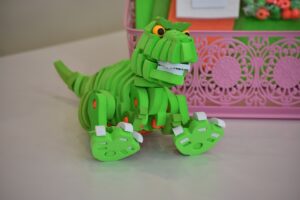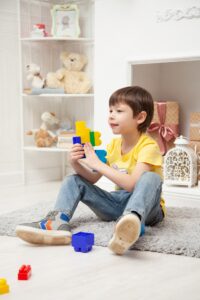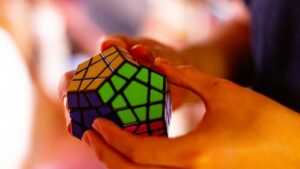When it comes to children’s puzzles, don’t just think of the regular alphabet type. In today’s digital world, there are plenty of types of puzzles for kids. As a parent, you should know the different types of puzzles. This will help your children to develop additional skills like imagination, cognitive, and many others.
However, puzzles are a hit among kids today. While they play with it, they learn and understand new things. Besides, the puzzles entertain them and stimulate the brain to solve a different kinds of problems. The more the children play with these puzzles, the more they can uniquely solve problems.
With mobile phones and several gadgets nowadays, playing puzzles independently of devices is acceptable. Although you can easily download the software and give your children to play, but the funs lies in table games. Allow your children to explore the types of puzzles, which will help them in high school activities.
In fact, with puzzle games, you can put your children’s minds to work. While playing the games together, you allow them to work some magic to foster cooperative play. Also, be patient, and resist the urge to help them. This way, your children will improve their thinking skills and imagination.
In this article, we will explain the types of puzzles for kids in today’s marketplace. Not only that, but you’ll know more about the sensory experiences children derived from playing puzzles. Additionally, we will talk more about the specific age to enroll your kids to puzzle games. Read further to know more.
What Are The Benefits Of Playing With Puzzles?
There are many benefits to playing with games in general. From early childhood to adulthood, everyone would love to play with puzzles or games. For example, as a parent, you can still play chess and scrabble at any point in time. Without further ado, below are the benefits of playing with puzzles.
● Encouraging Problem-Solving Skills – Encouraging problem-solving skills is one of the benefits of playing games. More so, puzzles come in many topics, including; shapes, color, pets, alphabets, and many others. With this, it helps your children increase their visual awareness.
● Improves Cognitive Solution – Completing a puzzle improves children’s cognitive skills. When they play the game, they realize their mistakes, and the experience could contribute a long way. This process involves reasoning ability, which they later transfer into their personal life.
● Encourages Trial and Error – The puzzle games are a trial and error process. As said earlier, when the children realize their mistakes, they learn and play the game from another perspective. This way, they know and play again to where it could make them understand the process better.
● Enhances and Promotes cooperative Play – The puzzle games for kids are a great educational tool to boost your child’s social and cooperative play. As they work to complete a puzzle, they discuss more while playing. This is why you need to create time for kids to handle frustration.
● It Brings a Sense Of Achievement – The excitement to play the puzzle games and win makes the game interesting for kids. Besides, overcoming the challenges involved in playing the puzzle games brings a sense of achievement o the children. This means the puzzles can provide a boost to children’s self-confidence and self-esteem.
● It Boosts Early Childhood Language Development – Some children are fast learners, and they quickly benefit from hearing new words. Also, when you speak to your kid, you will definitely expose them to vocabulary building. As a result, it boosts their language skills. That being said, you can be running commentary to make the puzzle lively and fun.
● Building Hand-Eye Coordination – As a school preschooler moves his/her hand to write, they watch closely when the pen moves. When playing puzzles, they keep their brain active to know the next movement. This process later builds the children’s hand-eye coordination.
Why Are Puzzles Called Brain Booster?
The benefits of buying the right types of puzzles for kids cannot be overemphasized. Solving puzzles help the brain, and that’s why people call it a brain foster. Besides, when your children solve a puzzle, it increases the production of dopamine. This is what helps your kids feel happier, which later improves concentration and memory. Below are the ways through which the puzzles can affect the brain.
- It strengthens short-term memory skills
- They help your kids know how to solve difficult problems
- Puzzle increases the production of dopamine
- It can help to reset your child’s brain and increase productivity
- Puzzle strengthens connections in your child’s brain
- It improves mental functioning and brain aging in children
- They challenge your kids to reach a higher goal
Do Puzzles Make Your Kids smarter?
It’s no doubt that your kid’s intelligence will increase while playing puzzles. But, the question now is; do puzzles make one smarter? Well, many of us play games like teasers, riddles, and more in the hope that it will sharpen our memory. Unfortunately, brain games like puzzles do not make your kids smarter.
According to a neurology specialist at Hong Kong’s Matilda International Hospital, Dr. Kin-Lun, puzzle games only provide mental stimulation. It’s a conversational subject that needs to be discussed in the long run. But the fact remains that puzzles can only boost your children’s intelligence and memory.
Types Of Puzzles For Kids
When you hear the word ‘puzzle,’ your mind probably goes to the classic alphabet puzzles. But, they’re not the only puzzle games in today’s world. There are tons of puzzles you can actually buy for your kids. Below, we have compiled the most popular ones that could make your children achieve their aim.
1. Frame Puzzles For Beginners
As the name implies, frame puzzles are suitable for kids between three years and above. It has interlocking pieces that go inside the frame. Children set and place the interlocking in order or accordingly to how it is being arranged. This covers a wide range of topics, including sports and animals.
2. Knob Puzzles For Children
The knob puzzles are one of the simplest kinds of puzzles for young kids. They are made from a wooden material, and the children quickly drop the shapes into the right space. Meanwhile, each puzzle has a big knob that makes it easy to manipulate. This puzzle game is suitable for kids between the ages of 3 to 6 years.
3. Peg Puzzles For Kids
The peg puzzles for kids are quite similar to the knob puzzle. In this kind of puzzle, the children set the alphabets or numbers in their respective spots. Meanwhile, it is suitable for a preschooler or toddler older than two years. It also helps kids with both language and math skills before going to school.
4. 3D Puzzle Games For Toddlers
The 3D puzzle games for toddlers are quite challenging to comprehend. It involves three-dimensional shapes instead of the flat image like the frame puzzles. This type of puzzle is mainly for children between the age of five and above. Some 3D puzzles enhance building skills but, most importantly, cognitive skills.
5. Floor Puzzles For Kids
The floor puzzles for kids is quite suitable for children between the age of 3 and above. They are similar to the jigsaw puzzle but different in some ways. Moreover, they are the best toys for promoting problem-solving skills. It contains over 24 pieces and could cover many topics like planets, jungle, and more.
6. Jigsaw Puzzles For Kids
The Jigsaw puzzles for kids is suitable for kids between the age of 3 and above. It consists of a printed picture on cardboard or wood. This kind of puzzle offers many benefits, and it’s quite challenging for all ages. As your child grows, he/she continue to develop a love for this type of puzzle game.
7. Rubix Cube For Toddlers
The Rubix cube for kids allows you, children, to develop hand-eye coordination skills and motor skills. On the flip side, it helps them to recognize colors and build concentration. Besides, it is a great tool to teach your children how to find many ways to solve a problem.
8. Connecting Puzzles For Kids
The connecting puzzles for kids are suitable for children between the age of two years and above. Here, children can make complex images with one game. It is fun, and to make this game more interesting, parents need to play with their kids. Also, it is similar to the frame puzzles but slightly different.
How to Choose the Types of puzzles for Kids
Choosing the right types of puzzles for kids may require a daunting process. If you’re surfing the internet, you’ll see hundreds of options that occur. In this case, look for a reliable brand or manufacturer that you can trust. Also, check the puzzle types, number of pieces, and the topic.
Conclusion
From problem-solving skills to cognitive development, the puzzle game is quite essential for kids. They support the children later in life and high school. Therefore, search around and buy the right types of puzzles for kids. Nonetheless, they prevent opportunities for you to interact positively with your kids.



